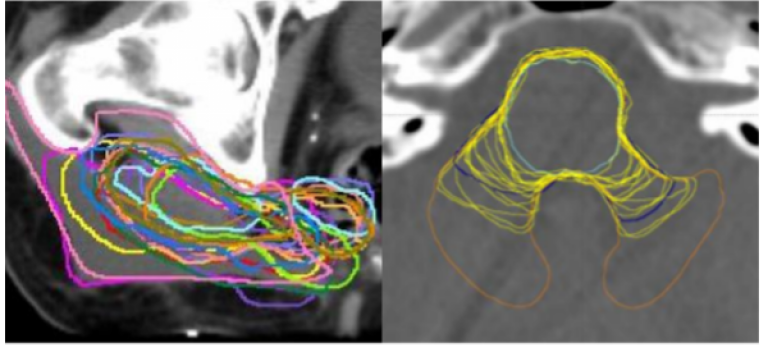NOW CLOSED: Measuring the variability of AI and manual delineations for radiotherapy
4-year PhD studentship funded by NPL, Mount Vernon Cancer Centre and the i4health CDT - Now Closed

14 March 2022
Primary Supervisor: Jamie McClelland
Additional Supervisors: Catharine Clark (UCL/NPL/RTTQA), Nadia Smith (NPL), Elizabeth Miles (RTTQA, MVCC), Peter Hoskin (RTTQA, MVCC).
Introduction:
A 4 year funded PhD studentship is available in a partnership between the Centre for Medical Image Computing (CMIC) and the Wellcome / EPSRC centre for Interventional and Surgical Sciences (WEISS) at UCL, the Medical Physics and Data Science groups at the National Physical Laboratory (NPL), the Mount Vernon Cancer Centre, and the NIHR Radiotherapy Trials Quality Assurance (RTTQA) group. Funding will be at least the UCL minimum. Stipend details can be found here.
The successful candidate will join the UCL CDT in Intelligent, Integrated Imaging in Healthcare (i4health) cohort and benefit from the activities and events organised by the centre. They will also benefit from activities and events organised by CMIC, WEISS, NPL, and RTTQA, and wider interaction with these groups.
Project Summary
Variability and reproducibility in delineating anatomy is arguably the biggest source of uncertainty in radiotherapy and inaccuracies impact on both tumour control and normal tissue toxicity. More accurate delineations would improve outcomes for patients both in survival and reduced toxicity, with the greatest impact for proton therapy where delineation variability can create large dosimetric uncertainties. Typically, delineation is performed manually by a clinician following national and local guidelines, which can take a significant amount of time and result in considerable variability between patients, clinicians, and clinical sites. Recently, several commercial and research AI solutions to delineate tissues have become available, with more on the horizon, which have the potential to both save time and reduce variability compared to manual outlining. These solutions are now starting to be adopted clinically in some hospitals, and the next few years are likely to see a considerable increase in the use of AI-generated delineations in clinical trials and for routine clinical practice. It is therefore imperative that objective and efficient methods for fairly assessing and comparing manual and AI-generated delineations are developed. This will help improve the efficiency and effectiveness of clinical trials and facilitate the safe adoption of AI solutions into clinical practice.
Research Aims
To develop state-of-the-art machine learning methods for measuring and parameterising variability in delineations over many patients, being suitable for both manual and AI-generated delineations. These methods will be used for objective and balanced comparisons between manual and AI-generated delineations for different cohorts of patients. This will be implemented to critically evaluate delineations for specific patients and determine if they are within the range of variability seen in the wider population, facilitating fair and efficient QA of delineations for clinical trials and routine clinical use.
How to apply:
Please complete the following steps to apply.
• Send an expression of interest and current CV to Dr Jamie McClelland and cdtadmin@ucl.ac.uk. Please use the subject title: Project Code 22009
• Make a formal application to via the UCL application portal https://www.ucl.ac.uk/prospective-students/graduate/apply . Please select the programme code MRes Medical Imaging TMRMEISING01 and enter Measuring the variability of AI and manual delineations for radiotherapy using machine learning Project Code 22009 under ‘Name of Award 1’.
- This studentship is strictly for those who pay Home fees. We cannot consider overseas students.
- If shortlisted, you will be invited for an interview.
- We offer students two different routes - MRes + PhD (4 years) or PhD (4 years). All candidates must apply via the MRes in the first instance and the panel will make a determination whether the student can be moved direct to PhD after interview.
Application Deadline - ADVERT CLOSED TILL NOVEMBER 2022
 Close
Close

